May 31, 2025 | 12:14 GMT +7
May 31, 2025 | 12:14 GMT +7
Hotline: 0913.378.918
May 31, 2025 | 12:14 GMT +7
Hotline: 0913.378.918
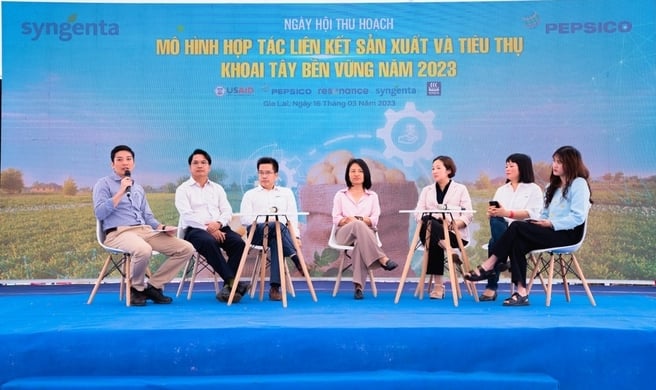
Workshop on the role of stakeholders in the chain of sustainable potato production and consumption.
The program "Harvest festival of sustainable potato production-consumption model" was held in Bau Can commune, Chu Prong district, Gia Lai on March 16.
The event is jointly organized by PepsiCo, Syngenta, Yara, USAIDS and Resonance. Over 200 farmers in the Central Highlands provinces were cordially invited. Farmers have the opportunity to directly observe the sustainable potato farming model currently deployed in Gia Lai, with the yield much higher compared to that previous seasons.
Potatoes among many other tubers are important crops in Vietnam's agricultural sector. Potatoes account for a large farming area in previous years, sometimes reaching over 100,000 hectares. However, only one-fifth of the above-mentioned area is still in production, whereas the consumption demand is high.
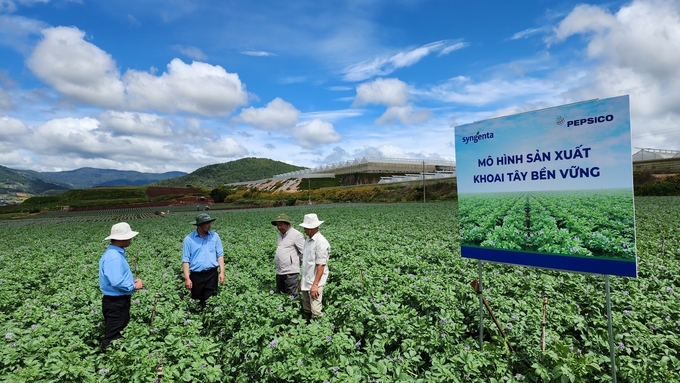
Syngenta and PepsiCo cooperated to develop sustainable potatoes. Photo: Dang Lam.
Potatoes in Vietnam are mainly potatoes served fresh in the domestic market. Demand for potato processing plants is estimated at 180,000 tons of raw potatoes per year. Domestic production only meets 40% of the demand, so the rest must be imported from many different countries.
Pressure from pests and diseases on potato plants greatly contributes to this issue. The management of pests and diseases, yield and quality improvement for commercial potatoes remains a difficult challenge that has discouraged many farmers from investing in this crop. Consequently, potato farming area in Vietnam has steadily declined in recent years.
Syngenta, PepsiCo, co-leaders of the fruit and vegetable working group under the Partnership for Sustainable Agriculture in Vietnam (PSAV), cooperated with Yara, Minosatek/Khang Thinh Together in addition to several NGOs such as USAIDS, Resonance to implement a strategic cooperation model for sustainable potato production in Vietnam. This agricultural linkage model has received support from many departments, sectors and localities across the country.
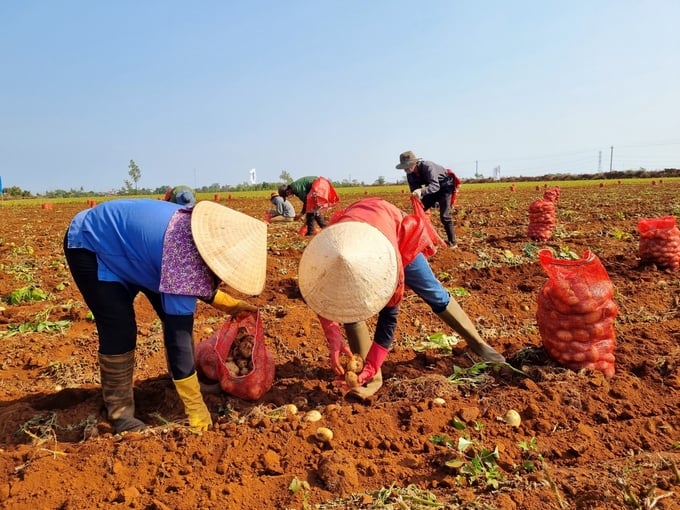
Potato farmers are supported in the production and consumption of products. Photo: Tuan Anh.
Thanks to the project, potato farmers will be supported with technical and proven advice regarding new varieties, farming techniques, effective and safe use of pesticides, safe and economical fertilization techniques, water-saving irrigation technology such as mist or drip irrigation, application of agricultural mechanization, harvesting machines in sustainable potato production and so on. On the other hand, businesses have actively created linkages to provide input materials as well as secure output for farmers.
Mr. Duong Ngoc Hung in Ia Tiem commune, Chu Se district, Gia Lai said: “My family grew sweet potatoes in the past and the price was unstable. After participating in the PepsiCo's workshop, I feel confident and have grown 3 crops, and we are currently stable in terms of output. Businesses support us with fertilizers, seeds so farmers are not bothered by investment capital. The contract price is clear and stable. Our 2 crops were profitable, and I'm looking forward to planting another crop.
After 4 years in development, the potato models have significantly increased the area, output as well as income of people participating in the project. The potato area in the 2018-2019 crop only reached 400 hectares with nearly 600 farmers participating; the potato area has nearly tripled in the 2021-2022 crop with 1,269 hectares; the average potato yield reached between 30 and 35 tons per hectare, with some areas reaching 50 tons per hectare.
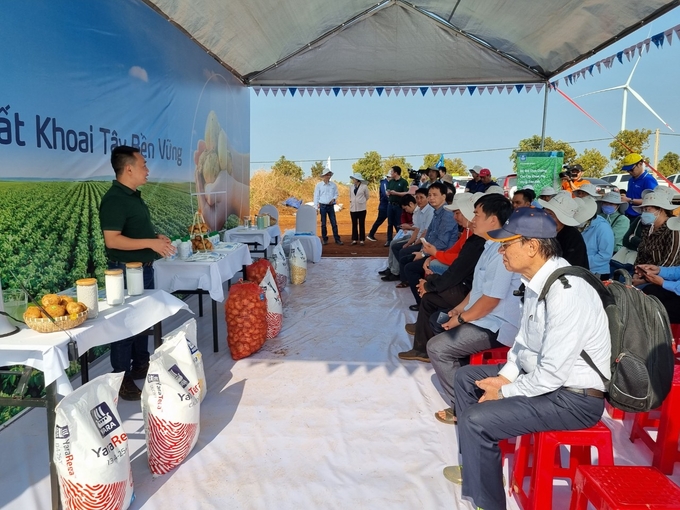
Farmers are very eager for the model of sustainable potato production. Photo: Dang Lam.
A series of smart solutions have been applied to the production chain in order to achieve the aforementioned breakthrough in potato productivity.
According to Syngenta's plant protection solutions, the number of pesticide sprays is havled compared to farmers' practices. In addition, the advanced method of spraying pesticides reduces labor costs as well as the amount of water and pesticides released into the environment.
Furthermore, the irrigation system controlled through mobile application informs the farmers of the exact amount of daily water evaporation in order to adjust the irrigation time based on data from weather stations, thereby reducing the amount of irrigation water by nearly 18%. Additionally, fertilizer is applied through this irrigation system, helping farmers cut down on 11% of chemical fertilizers.
Regarding yield optimization, experts recommended farmers to increase planting density from 44,000 bushes/hectare to 52,000 bushes/hectare, thereby increasing yield by 8%.
The model has formed the link of production and consumption of potato products in the provinces of Lam Dong, Dak Lak, Gia Lai, etc. as a basis for expanding potato production to areas in Vietnam for future crops. As a result, the model has contributed to improving product value and land use coefficient per unit area, crop rotation, land improvement, and income for farmers.
The cooperation between major corporations in the potato production-consumption chain has marked an important progress in promoting sustainable potato production, increasing the proportion of domestic potatoes and proactively sourcing raw materials in food processing activities. The resulting potato products meet both domestic and international standards.
Based on practical effects from the model, parties in the value chain will continue to implement and expand the project to develop a model potato farm in select Central Highlands provinces such as Lam Dong, Dak Lak and Gia Lai between 2022 and 2025. The project aims to expand the production scale to over 2,000 hectares with over 1,000 participating farmers, with the goal of helping farmers increase the yield and quality of potatoes, bring in real profits after cultivation and adapt to climate change, contributing to environmental protection in agriculture.
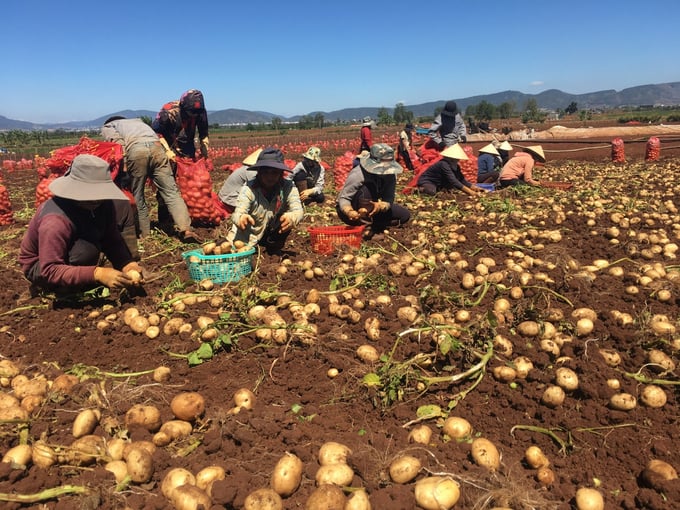
Sustainable potato production consistently gives high yield. Photo: Tuan Anh.
Mr. Nguyen Kim Hanh, Director of Agronomy under PepsiCo Vietnam commented: “We had to import a lot of raw potatoes from Germany and the US to serve the domestic snack processing and consumption in the past. Thanks to the sustainable potato production and consumption model, PepsiCo's domestic potato consumption rate has increased significantly in 2022 and we aim to reach 100% localization by 2025."
Mr. Pham Huy Thang, Director of Agricultural Research and Development under Syngenta Vietnam Company, said: “In this value chain, Syngenta plays the role of accompanying PepsiCo to support training potato growers in growing techniques, pests and diseases management using safe, effective and responsible pesticides.
By applying advanced plant protection technologies and solutions that have been successfully researched and tested locally by Syngenta, potato farmers have better pests and diseases management, increase potato yield and the quality meets the requirements of PepsiCo. Consequently farmers have a better and more stable income, which means they are more likely to continue investing in this crop. Syngenta also wishes to accompany farmers to actively contribute to increasing the value of Vietnam's sustainable agricultural production chain."
Mr. Nguyen Kim Hanh remarked: “We have successfully exported the first batch of potatoes to the Thai market in 2022 and the product is highly appreciated by our partners for its quality. This is the basis for us to set further goals in building Vietnam to become a major potato exporter in Southeast Asia through the expansion of farming area and the increased participation of farmers and partners in Vietnam”.
Translated by Nguyen Hai Long

(VAN) Several scientists and farmers are experimenting with soil treatment in some key durian-growing regions such as Cai Lay (Tien Giang), Dak Song, Gia Nghia, and Dak R’lap (Dak Nong).
/2025/05/25/4127-3-073637_820.jpg)
(VAN) Thanks to the promotion from an FAO-implemented project, vegetable production in greenhouses in Moc Chau has seen strong development, from 1.5 hectares in 2021 to nearly 50 hectares in 2024.

(VAN) FAO has recently supported USD 140,000 to implement the project 'Risk mitigation human-animal interface risks through disease control initiatives in pig farming.'

(VAN) The People's Committee of Tra Vinh province has approved an adjustment to the investment policy for the Green Hydrogen Plant project, increasing its area to approximately 52.76 hectares.
![Reducing emissions from rice fields: [2] Farmers’ commitment to the soil](https://t.ex-cdn.com/nongnghiepmoitruong.vn/608w/files/news/2025/05/05/dsc08881jpg-nongnghiep-140632.jpg)
(VAN) Clean rice cultivation model in Thuong Tan commune, Bac Tan Uyen district, is assisting local residents in achieving sustainable agriculture by substantially reducing costs, increasing productivity, and protecting the environment.

(VAN) At the conference to disseminate Resolution No. 68, AgriS introduced its digital agricultural ecosystem and reaffirmed its commitment to accompanying the Government in promoting private sector development and sustainable agriculture.

(VAN) 'Blue Ocean - Blue Foods' initiative is designed to restore marine ecosystems and establish sustainable livelihoods for local communities by cultivating a minimum of 1,000 hectares of cottonii seaweed in the first three years.